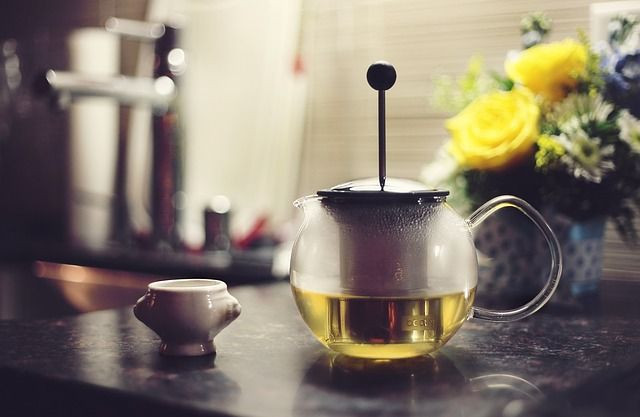Iron-Rich Foods, Like Red Meat And Kale, May Hamper Green Tea's Health Benefits

It’s no secret that drinking green tea offers a plethora of health benefits. Recent studies have linked it to lower cholesterol and reduced inflammation in patients with irritable bowel disease (IBD). However, these health benefits might be diminished when the antioxidant beverage is paired with foods that contain iron, according to new research published in The American Journal of Pathology.
“The benefit of green tea depends on the bioavailability of its active components,” said Beng San Yeoh, first author of the study, in a news release. “It is not only a matter of what we eat, but also when we eat and what else we eat with it.”
Researchers from Penn State University examined the relationship between green tea and dietary iron in the lab using mice with inflammatory bowel disease. They found that when the beverage is consumed alongside iron supplements or iron-rich foods — red meat, olives, and kale — the tea’s main antioxidant, epigallocatechin gallate (EGCG), binds to the iron.
Under normal conditions, EGCG suppresses myelopeoxidase a pro-inflammatory enzyme that white blood cells release in response to a stimulus. Researchers believe this suppression contributes to the mitigation of IBD flare ups that green tea confers. When EGCG and iron are consumed at the same time, however, the iron-bound EGCG molecules lose their ability to inhibit myelopeoxidase, thus making green tea less effective, or altogether ineffective, for IBD patients.
IBD is an umbrella term for ulcerative colitis and Crohn’s disease, both of which are characterized by chronic inflammation of the digestive tract. Symptoms typically include rectal bleeding, persistent diarrhea, and weight loss. Roughly 60 to 80 percent of patients with the disorders also experience an iron deficiency. It’s not uncommon for these patients to be prescribed iron supplements, thus presenting them with a catch 22 if they also drink green tea for their IBD.
“It’s important that IBD patients who take both iron supplements and green tea know how one nutrient affects the other,” said principal investigator Matam Vijay-Kumar. Although the study was conducted in mice, Vijay-Kumar told Medical Daily the findings could apply to humans too, because “chemistry is chemistry.”
Based on the results, he believes there is “no way people can drink green tea and take iron simultaneously,” and have either provide the same effect — regardless of whether they’re diagnosed with an illness or completely healthy. In fact, shortly after publishing the study, he received an email from a man who took iron supplements and drank green tea. The man said he recently tried to donate blood, but was denied because it appeared he was anemic.
Source: Yeoh B, Olvera R, Singh V, et al. Epigallocatechin-3-Gallate Inhibition of Myeloperoxidase and Its Counter-Regulation by Dietary Iron and Lipocalin 2 in Murine Model of Gut Inflammation. The American Journal of Pathology. 2016.
Published by Medicaldaily.com



























